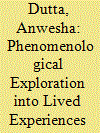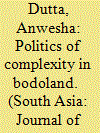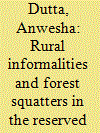| Srl | Item |
| 1 |
ID:
178860


|
|
|
|
|
| Summary/Abstract |
The Bodoland Territorial Autonomous Districts (BTAD) in the state of Assam in Northeast India can be described as a landscape of terror since the area has been a stage for recurrent, mostly violent contestations along ethno-religious lines for more than four decades. Over the years, the violence has claimed more than a thousand lives and displaced millions. Using a multi-sited ethnography carried out over more than eleven months of fieldwork in the region, this paper looks at the everyday lives of those affected by the conflict and critiques the notion of spectacular resistance and exceptionalism in the context of Northeast India. This is done by using a phenomenology of lived experience framework to pay closer attention to the distinctly ordinary ways in which populations survive and endure states of dispossession, displacement and abandonment.
|
|
|
|
|
|
|
|
|
|
|
|
|
|
|
|
| 2 |
ID:
145466


|
|
|
|
|
| Summary/Abstract |
The 2014 Lok Sabha elections witnessed a significant shift in the political spectrum of the Bodo Territorial Autonomous District (BTAD) in Assam, with non-Bodos voting en masse for an independent candidate, a former United Liberation Front of Assam (ULFA) militant who was backed by a collective of non-Bodo organisations. Using the elections as a focal point, this paper aims to explore the larger political dynamics, political mobilisation and shifting alliances within a framework of contentious politics and collective action that unfurled during the elections and eventually led to an episode of targeted violence against the Muslim community in BTAD.
|
|
|
|
|
|
|
|
|
|
|
|
|
|
|
|
| 3 |
ID:
160927


|
|
|
|
|
| Summary/Abstract |
It has now been well established that forests in South Asia are postcolonial political zones. In Assam, in northeast India this was accomplished through the colonial project of converting jungles into Reserved Forests. Using the politics of dokhol (“to grab or occupy by force”) as an entry point, this article examines the comparative epistemologies of squatting and informality in urban and rural contexts. My intent is to unpack the everyday practice, maintenance, and sustenance of dokhol within the reserved forests of Bodo Territorial Autonomous District. This entails an extension of existing scholarship on formal-informal dichotomies in relation to rural squatters, in particular those on forestland. I do so by combining an ethnographic study of dokhol by rural squatters with three influential strands of critical scholarship on urban squatting, namely Partha Chatterjee’s “political society,” Asaf Bayat’s “quiet encroachment,” and Ananya Roy’s take on planning and deregulation. This article advances the case of rural informalities and opens a dialogue between the two forms of informalities – rural and urban, especially in the context of South Asia.
|
|
|
|
|
|
|
|
|
|
|
|
|
|
|
|